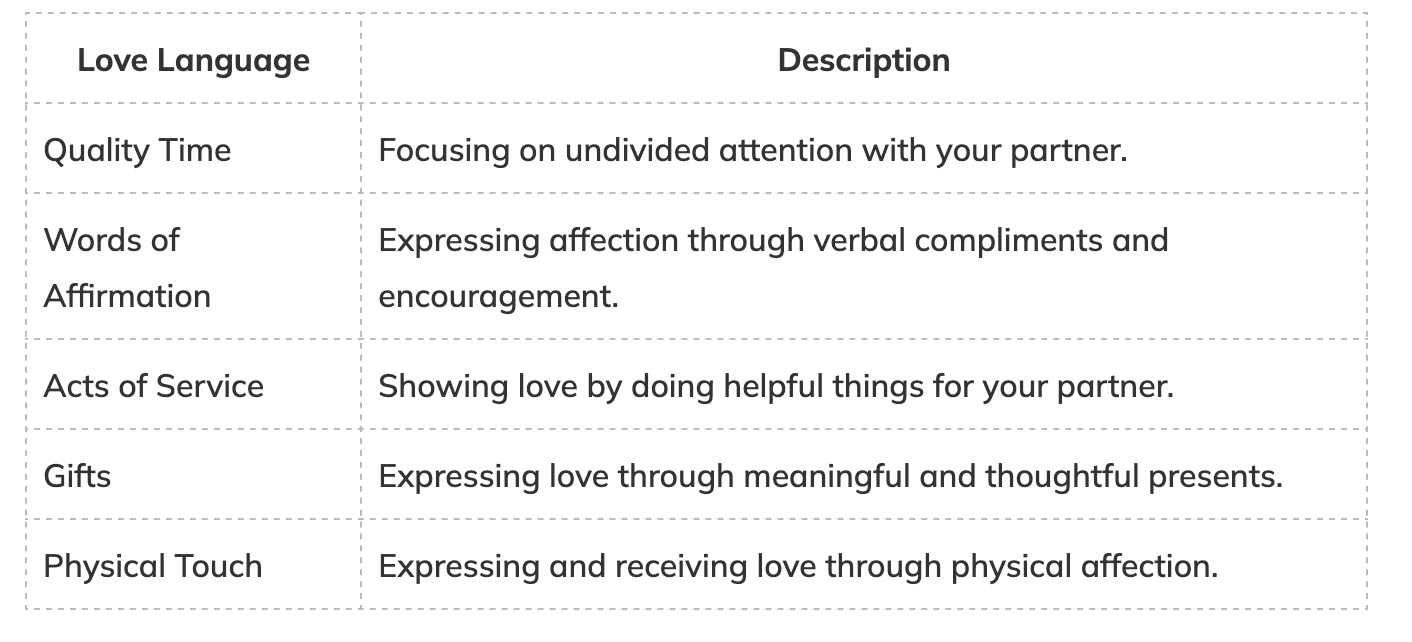Understanding the 5 Neurodivergent Love Languages
#TalkNerdyToMe® Staff Writer
Understanding the ways people express and receive affection is crucial for building strong and fulfilling relationships. While the five love languages have been a popular framework for understanding affection, they may not fully capture the unique ways in which neurodivergent people express love. This article will explore how neurodivergent love languages differ from traditional love languages and how understanding these differences can strengthen neurodivergent relationships. We'll delve into the 5 neurodivergent love languages, offering insights into how neurodivergent individuals often show they care and experience love and affection.
Introduction to Neurodivergent Love Languages
The concept of love languages provides a framework for understanding how individuals express and receive love. However, many neurodivergent people find that the traditional five love languages—words of affirmation, quality time, gifts, acts of service, and physical touch—don't fully resonate with their experiences. This has led to the exploration of neurodivergent love languages, which encompass unique ways neurodivergent individuals may show love and experience affection.
What is a Love Language?
A love language describes how someone primarily expresses love to their partner and how they would like their partner to express love in return. There are five love languages. Understanding these preferences can significantly improve communication and strengthen emotional bonds in any relationship. Some love languages are described in the table below:
These ways of expressing love highlight the different methods people use to show they care for their partner and feel cared for in return.
Defining Neurodivergence
Neurodivergence refers to variations in the brain that affect how a person processes information, interacts with the world, and experiences sensory input. Conditions such as ADHD and autism spectrum are examples of neurodivergence. Many neurodivergent individuals experience the world differently. This difference can impact how they form relationships and how they express and receive love. Understanding neurodivergence is key to appreciating the nuances of neurodivergent relationships and love languages.
Importance of Understanding Neurodivergent Love Languages
Understanding neurodivergent love languages is essential for fostering healthy and fulfilling neurodivergent relationships. Many neurodivergent people may express love in ways that differ from neurotypical expectations, such as through parallel play, infodumping, or acts of service that might seem unconventional. By recognizing and valuing these expressions of affection, we can create a more inclusive and supportive environment for neurodivergent individuals. This will also lead to stronger connections within the neurodivergent community. Understanding how autistic people express love is key.
The Five Neurodivergent Love Languages
1. Acts of Service
For many neurodivergent people, particularly those with ADHD, acts of service are a very important neurodivergent love language. These actions are a tangible expression of love, demonstrating care and support in practical ways. This goes beyond simply doing chores; it includes anticipating needs, providing assistance with tasks, and actively making life easier. These acts of service are an impactful way to show they care and express love, resonating deeply with neurodivergent individuals who value efficiency and practicality.
2. Words of Affirmation
While neurodivergent individuals often find non-verbal forms of communication more effective, words of affirmation can still be a potent neurodivergent love language. Neurodivergent people may crave direct and unambiguous communication, valuing specific praise and validation. These individuals appreciate hearing explicit acknowledgements of their strengths, efforts, and unique qualities. Understanding neurodivergent love languages means recognizing that words of affirmation should be genuine and tailored to the individual's experiences and sensitivities.
3. Quality Time
Quality time, as a neurodivergent love language, often looks different for neurodivergent people. It is not always about direct eye contact or constant conversation. Instead, it may involve parallel play, where two individuals engage in separate activities in the same space. This creates a shared presence without the pressure of intense interaction. Some neurodivergent individuals often find comfort in shared silence or engaging in a special interest together. Understanding this nuance is crucial in neurodivergent relationships.
4. Physical Touch
Physical touch can be a complex neurodivergent love language for neurodivergent people. Some individuals may be highly sensitive to touch, finding certain sensations overwhelming or unpleasant. Others may seek out specific types of physical touch, such as deep pressure, for sensory regulation and comfort. A gentle hug or a weighted blanket could be a more appreciated expression of love than a light touch. Communication and awareness are key to understanding the nuances of physical touch within neurodivergent relationships.
5. Receiving Gifts
Receiving gifts, as one of the five love languages, can also manifest uniquely in neurodivergent relationships. For many neurodivergent people, gifts are appreciated less for their monetary value and more for their thoughtfulness and relevance to their special interests. A carefully chosen item that aligns with a passion or provides sensory comfort can be a powerful expression of love. It is important to understand the individual's specific preferences and avoid generic gifts that may lack personal meaning.
Unique Ways to Express Love in Neurodivergent Relationships
Penguin Pebbling
Penguin pebbling, a term coined within the autistic community, refers to the act of offering a small, often seemingly insignificant, item to a loved one as a token of affection. This neurodivergent expression of love mirrors the behavior of penguins, who present pebbles to their chosen mates. The offered item might be a smooth stone, a shiny button, or any object that holds personal significance to the giver. This is a unique way for autistic people to express love and affection.
Deep Pressure Techniques
Deep pressure techniques, such as firm hugs, weighted blankets, or tight squeezes, can be a comforting and grounding neurodivergent love language for many neurodivergent individuals. These techniques provide proprioceptive input, which can help regulate sensory processing and reduce anxiety. Offering deep pressure is a way of showing care and support, providing a tangible sense of safety and security. Exploring various deep pressure techniques can be a great way to show you care.
Body Doubling as Support
Body doubling, a common support strategy for neurodivergent people, especially those with ADHD, can also be considered an expression of love and support. Body doubling involves having someone present while you work on a task, providing a sense of accountability and motivation. This presence can be physical or virtual. Offering to body double for someone is an act of service and a way of showing that you care about their success and well-being. Many neurodivergent individuals may find comfort in this.
Neurodivergent and Neurotypical Interactions
Understanding the Swap in Love Languages
The contrast between traditional love languages and neurodivergent love languages can sometimes create misunderstandings between neurotypical and neurodivergent people. Many neurodivergent people may express love in ways that neurotypical individuals don't immediately recognize. For example, acts of service can be misinterpreted if they are not explicitly communicated as expressions of affection.
Understanding this swap in love languages may help bridge the gap between the neurodivergent community and neurotypical individuals, fostering more meaningful connections.
Parallel Play in Relationships
Parallel play is a unique expression of love and affection that is common in neurodivergent relationships. This involves engaging in separate activities while being in the same physical space. Many neurodivergent people find comfort in this shared presence without the pressure of constant interaction or direct communication. Understanding the nuances of parallel play can help neurotypical partners appreciate this neurodivergent love language. This helps foster a deeper connection and mutual understanding of how each individual likes to receive love and show love.
Infodumping: Sharing and Receiving Information
Infodumping, the act of sharing detailed information about a special interest, can be a significant way many neurodivergent individuals show they care and express love. It's an invitation to enter their world and a demonstration of trust. While this behavior may seem overwhelming to neurotypical individuals, viewing it as a neurodivergent love language can shift the dynamic. Neurodivergent people may feel like they are expressing love and affection through the information they give, as well as the information they receive.
Enhancing Relationships Through Neurodivergent Love Languages
Support Swapping: A Key to Connection
Support swapping is a fundamental aspect of many healthy neurodivergent relationships. This involves reciprocally providing support in areas where each partner may struggle. For instance, one partner may help the other with executive functioning tasks, while the other provides emotional regulation support. Recognizing and valuing these exchanges as neurodivergent love languages can strengthen the bond between neurodivergent people. This is by emphasizing mutual care and understanding. Furthermore, support swapping can even out the love languages each individual leans towards.
Sharing Spoons and Energy Management
The concept of "spoon theory" is often used within the neurodivergent community to describe energy levels and how they are managed. Sharing spoons, in the context of neurodivergent love languages, involves being mindful of a partner's energy limitations and adjusting activities accordingly. This can include offering assistance with tasks, providing quiet time, or understanding when a partner needs to recharge. This act of service shows care that neurodivergent people may find comfort in this love language.
Creating a Safe Space for Expression
Creating a safe space is vital for fostering healthy neurodivergent relationships. This involves cultivating an environment where each partner feels accepted, understood, and free to express their authentic selves without fear of judgment. This extends to respecting sensory sensitivities, communication preferences, and unique ways of expressing love and affection. Embracing neurodivergent love languages requires patience, empathy, and a willingness to learn and adapt to the individual needs of the partner. Also, understanding neurodivergent love languages helps autistic people foster relationships.




